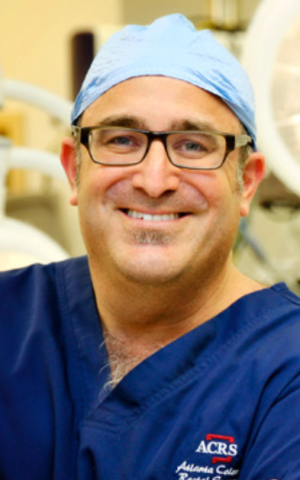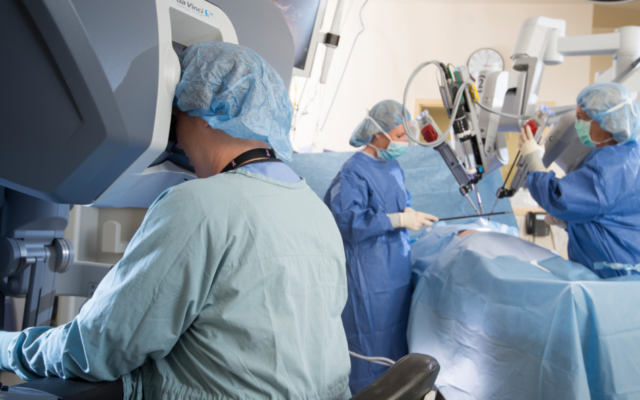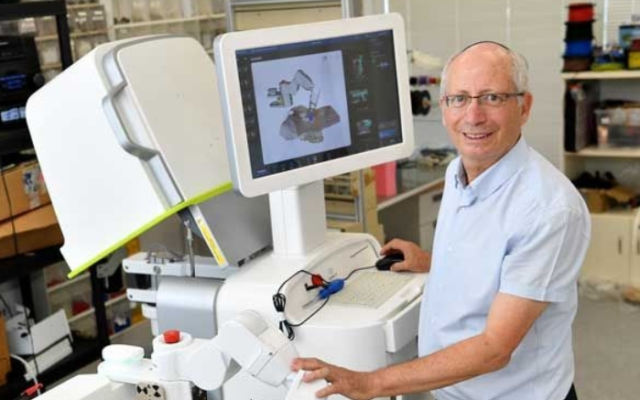Robotic Surgery May Revolutionize Medical Care
Major manufacturer of robotic surgical systems plans $500 million dollar expansion in Peachtree Corners.
Atlanta is rapidly becoming the center of what some consider to be one of the more important advances in medical technology today: the use of robots in surgery.
These multi-million-dollar machines bring together computers and imaging and sensing technology to guide tiny instruments. The small surgical tools are inserted through incisions, which in many cases are less than a half-inch in length.
If you are facing a surgical procedure involving the spine and hips, the colon, the head and neck, the heart, the male urological tract or the female reproductive system, there is a good chance that your doctor could be working with a robot.
Because the machines never tire and the mechanical arms are rock-steady, robots are able to perform procedures that have not been possible in the past. Last year, about 900,000 procedures were performed this way in American hospitals equipped with about 5,000 robotic platforms.

One of the local pioneers in the field is Dr. Jeffrey Cohen, who practices at Atlanta Colon and Rectal Surgery, which is part of the Northside Hospital network.
For patients with inflammatory bowel conditions that do not respond well to medication, surgery is often the next step. That includes some sufferers of colitis and Crohn’s disease, which often afflicts Ashkenazi Jews.
According to Cohen, 35 percent of all colorectal surgery in the Atlanta area is done robotically. He maintains that robotic surgery offers some distinct advantages over what has been done in the past.
“Operations that we used to do through a big incision or with smaller instruments, laparoscopically, we can now do robotically,” he said. “So, by doing Crohn’s surgery or ulcerative colitis surgery robotically, and many other procedures, I can be more precise. I have a three-dimensional visualization system that sees inside someone’s abdomen. It’s less traumatic. There’s less blood loss, there are less complications and there are shorter hospital stays.”
In the next decade, the use of robotics is predicted to accelerate dramatically. By 2030, it’s thought that about a third of all surgical procedures will be assisted by robotic devices, which translates to about 3.5 million medical operations.
Based on data from recent pilot projects, some of that growth could come from using newly deployed 5G telecommunication networks. In the last couple of years, procedures have been performed in which the patient and the surgeon were as far as 1,500 miles apart.
By 2030, industry analysts predict that the market for surgical robots could quadruple from about $4 billion today to about $17 billion ten years from now.

That’s the kind of growth that motivated the company Intuitive Surgical, the dominant player in robotic surgery, to announce in August a dramatic expansion of its manufacturing and engineering facility in Gwinnett County’s Peachtree Corners community.
Over the next three years, the company, which now employs about 180 here, will add 1,200 new jobs and expand the site to 750,000 square feet. It expects to spend over $500 million on the project.
Although Intuitive is headquartered in California’s Silicon Valley, the CEO of the company, Gary Guthart, was impressed with the potential that the county’s metropolitan area has to offer, as well as the 2,000 other life science companies based in Georgia.
“Intuitive needs a highly educated, committed and diverse workforce; quality infrastructure; and the right geography to meet the rising demand for minimally invasive surgical technologies,” he said.
Dr. Cohen trains colorectal surgeons at the local Intuitive complex. Surgeons come from around the country to learn basic and advanced techniques at the 20 robotic surgical suites the company has built in Peachtree Corners. He believes that the industry leader in robotics is getting ready to usher in a new era in surgery.
“I am told that the center here is going to be expanding exponentially. And I am told that they are going to be doing robotic production, actually, here in Peachtree Corners; that they’re going to be making Intuitive’s da Vinci robots here. We’re absolutely going to become a national and international center for robotic surgery.”

Israel has also been a leader in developing robotic medical technology. In 2019, surgeons at Hadassah Medical Center in Jerusalem performed the world’s first robotic procedure using two robots that were, in effect, communicating with each other.
One of the robots was manufactured by an Israeli company, Mazor, which makes robotic guidance systems for spine and brain surgeries and was acquired two years ago by Medtronic, a major American medical technology company, for $1.64 billion.
Mazor’s founder, Moshe Shoham, is a researcher at the Technion-Israel Institute of Technology. Earlier this year, Dr. Shoham described his work in developing one of the first robotic surgical tools for work in the brain. It could give doctors a precise way to remove tumors and blood clots without affecting the delicate, surrounding tissue.
The advances come at a time when robotic surgery is starting to benefit from a wide array of technology and advances in artificial intelligence. The devices might one day be able to allow surgeons to venture deep into the brain using the advanced imaging techniques that Professor Shoham has developed to guide the robotic tools.
“We hope we will be able to let people suffering from the conditions get back to their lives,” he told The Times of Israel. “We believe that our robotic system can do this better than a surgeon’s free hand.”
- Bob Bahr
- health & Wellness
- Community
- robotic surgery
- Intuitive
- Jeffrey Cohen
- colorectal surgery
- brain surgery
- 5G technology
- Peachtree Corners
- Moshe Shoham
- Israel medical technology
- Hadassah Medical Center
- Jerusalem
- Atlanta
- male urological tract
- female reproductive system
- Atlanta Colon and Rectal Surgery
- northside hospital
- Colitis
- Crohn's disease
- Ashkenazi Jews
- abdomen
- Intuitive Surgical
- Gwinnett County
- Gary Guthart
- da Vinci robot
- Medtronic
- Mazor
- Technion-Israel Institute of Technology




comments